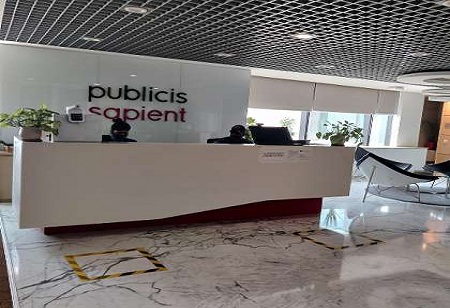
Digital consulting firm Publicis Sapient to set footprints in India ops

 Publicis Sapient, a French digital consulting firm, will continue to expand its India operations by leveraging Indian talent to drive strategic differentiation for its global clients.
Publicis Sapient, a French digital consulting firm, will continue to expand its India operations by leveraging Indian talent to drive strategic differentiation for its global clients.
The company, which was one of the first to offshore high-end digital consulting services to India, currently has about 10,000 employees in India out of a total of 20,000.
"This model has taken us 20 years to build. The kind of capability we are hiring in India, the talent we are building, and the investments we have made in systems and processes, combined with a 50/50 mix, means that our teams, even if they are working in India and travelling some of the time, are deeply embedded in client transformations, almost like our local teams," said Vaz.
Publicis Sapient has grown by 21% for seven consecutive quarters as the pandemic has accelerated the transition to digitalization, resulting in increased global demand for digital capabilities.
Vaz attributed the company's impressive growth and progress to their refined Globally Distributed Delivery model, which has been fine-tuned over the last 20 years and includes a strong presence in India as a key component of global projects.
"The difference for us is that we don't view India as a front-end or back-end market. The reason being, India represents all of our capabilities. So, we have strategy capability, product capability, experience capability, and engineering capability in India, and we are absolutely continuing to drive the model where basically everything that happens in the US, UK, and Europe also happens in India," said Vaz.
In line with the global trend, digitisation has emerged as a critical area of focus for Indian businesses, resulting in an unprecedented demand for consultants who can assist in the implementation of technology-driven transformations.
"Today, digital is no longer a 'nice to have'. It is existential, not tangential to business. It is essentially one of the most important deflationary forces that a CEO can deploy, taking into account the current macroeconomic environment. Leaders need to think about how they can be more efficient, launch products and services faster to continue growing. It will require you to operate very differently than how traditional businesses did previously. Digital is one of the fastest ways to accomplish growth without adding costs," said Vaz, who has authored the book 'Digital Business Transformation: How Established Companies Sustain Competitive Advantage from Now to Next'.
The consultant said that traditionally, the Indian market was averse to paying a premium associated with digital transformation, but given how the market in India was evolving, there seemed to be a shift from the long-followed price-conscious mindset to a value-seeking mindset. "In the future, the region shows promise as a potential market for many players offering transformational digital solutions," Vaz said. Publicis Sapient currently doesn't serve the Indian market.
Companies ranging from strategy firms like McKinsey and BCG to tech-led players like Accenture and IBM to the Big Four consulting divisions are all expanding their digital solutions portfolio, putting pressure on pure-play digital consultants like Publicis Sapient.
"The competition has already heated up tremendously right now. Our entire credibility comes from being strategic, being able to build the product, the design experience, engineering it, and then ultimately building the data and AI ecosystems to evolve them. It is a very compelling proposition, which is also one of the reasons behind our growth"" said Vaz.
ChatGPT, an artificial intelligence tool, has recently gained popularity, and many experts believe that AI has the potential to revolutionise a variety of industries. Ask Vaz if it has the potential to disrupt digital consulting as well.
He said, "I think it's going to be absolutely incredible! The way I think about this is that you have to change the 'I' in IT from 'information' to 'intuition'. So, it has to be intuition technology. It will replace simple human work, not human beings. When word processors came in, yes, they did replace typewriters, but the people who were using typewriters moved on to using Word, and they were so much more productive. People need not indulge in tedious, time-consuming work and instead allow technology to take over. It's the next generation of how we think about people in relation to technology."